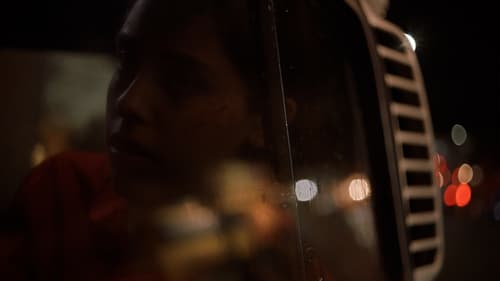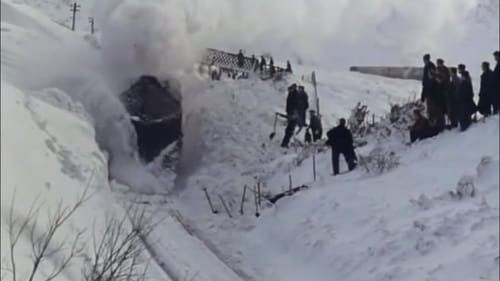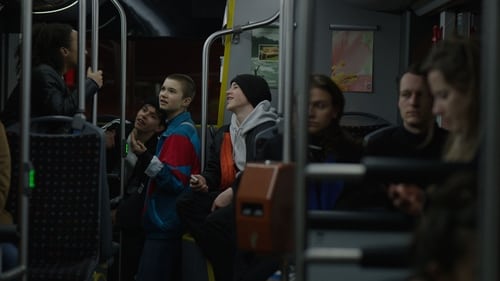Od Karolinky ke Sputniku (1973)
Género : Documental
Tiempo de ejecución : 0M
Director : Aleš Lowák
Escritor : Ivo Odehnal, Jan Lederer
Sinopsis

Miranda, la delantera del Manchester Acatitla, tiene un altercado en el campo de juego que le genera una cicatriz en el rostro. Sus compañeras y ella se enfrentan a la agresividad del equipo rival, generando un ambiente violento entre mujeres. A pesar de las circunstancias, el equipo de Miranda consigue la victoria y ella emprende un viaje de regreso a casa. En el camino, Miranda se enfrenta a los peligros fuera de la cancha.

This was a news film with elements of reenactment. From December 1927 to 1932, 2,000 bus and train drivers were fired, provoking a strike. This film was edited out of footage shot from that strike over a long period.

Since World War II North Americans have invested much of their newfound wealth in suburbia. It has promised a sense of space, affordability, family life and upward mobility. As the population of suburban sprawl has exploded in the past 50 years Suburbia, and all it promises, has become the American Dream. But as we enter the 21st century, serious questions are beginning to emerge...

A short experimental film by Japanese underground filmmaker Shozin Fukui. The film follows a young woman on the Tokyo subway, who may be possessed.

A documentary exploring the Beavercreek-RTA dispute.

Short journey by tram in a big city where an older woman and a hasty man are bound together by circumstances. He is not pleased with it. Or is he?

As the modernisation of London Underground continues, long serving A-Stock and C-Stock trains have been withdrawn from service, and their differing characters will slowly become a memory. London Transport Museum commissioned Geoff Marshall to record the transition between old and new trains.

The remarkable true story of Darius McCollum, a man with Asperger's syndrome whose overwhelming love of transit has landed him in jail 32 times for the criminal impersonation of NYC subway drivers, conductors, token booth clerks, and track repairmen.

A woman stalked by depression makes some extreme decisions.

Transport is a city’s living, beating soul, as lovingly depicted in A Way We Go, a documentary feature by Jacqui Hicks. With an unconventional format emphasising the wisdom and emotions of everyday people, it captures a bubbling flow of ideas and images with a vivid dash of humanistic humour.

Comprising train and track footage quickly shot just before a heavy winter's snowfall was melting, the multi-award-winning classic that emerged from the cutting-room compresses British Rail's dedication to blizzard-battling into a thrilling eight-minute montage cut to music. Tough-as-boots workers struggling to keep the line clear are counterpointed with passengers' buffet-car comforts.

"The End of the Line - Rochester's Subway" tells the little-known story of the rail line that operated in a former section of the Erie Canal from 1927 until its abandonment in 1956. Produced in 1994 by filmmakers Fredrick Armstrong and James P. Harte, the forty-five minute documentary recounts the tale of an American city's bumpy ride through the Twentieth Century, from the perspective of a little engine that could, but didn't. The film has since been rereleased (2005) and now contains the main feature with special portions that were added as part of the rereleased version. These include a look at the only surviving subway car from the lines and a Phantom tun through the tunnels in their abandoned state, among others, for a total of 90 minutes of unique and well preserved historical information.

No Measure of Health profiles Kyle Magee, an anti-advertising activist from Melbourne, Australia, who for the past 10 years has been going out into public spaces and covering over for-profit advertising in various ways. The film is a snapshot of his latest approach, which is to black-out advertising panels in protest of the way the media system, which is funded by advertising, is dominated by for-profit interests that have taken over public spaces and discourse. Kyle’s view is that real democracy requires a democratic media system, not one funded and controlled by the rich. As this film follows Kyle on a regular day of action, he reflects on fatherhood, democracy, what drives the protest, and his struggle with depression, as we learn that “it is no measure of health to be well adjusted to a profoundly sick society.”

It's 10:47 pm on a bus somewhere in a city. A few teenagers are listening to music and talking loudly. The other passengers look languidly out the window or at their cell phones. A drunk man gets in and joins the teenagers; the mood starts to shift.

A young man in a tram is asking a bit too much from a stranger.

Los chóferes del transporte público urbano en Bogotá no perciben un salario fijo¸ tan sólo un porcentaje por pasajero recogido. A través del testimonio de dos campeones de esta guerra diaria¸ se muestra una cotidianidad ingrata¸ angustiosa y peligrosa¸ tanto para los usuarios como para los mismos conductores¸ y de la cual los únicos que se benefician son los grandes empresarios del transporte¸ verdaderos artífices de una cruenta guerra en la que el Estado es apenas un espectador indolente.












